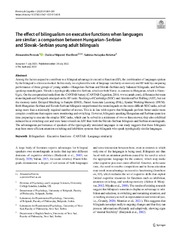| dc.description.abstract | Among the factors argued to contribute to a bilingual advantage in executive function (EF), the combination of languages spoken
by the bilingual is often overlooked. In this study, we explored the role of language similarity on memory and EF task by comparing
performance of three groups of young adults—Hungarian–Serbian and Slovak–Serbian early balanced bilinguals, and Serbianspeaking
monolinguals. Slovak is typologically related to Serbian, which are both Slavic, in contrast to Hungarian, which is Finno–
Ugric. On the computerized tasks from the CANTAB battery (CANTAB Cognition, 2016, www.cantab.com), differences between
monolinguals and bilinguals emerged on the EF tasks: Stockings of Cambridge (SOC) and Attentional Set Shifting (AST), but not
the memory tasks: Delayed Matching to Sample (DMS), Paired Associate Learning (PAL), Spatial Working Memory (SWM).
Both Hungarian–Serbian and Slovak–Serbian bilinguals outperformed the monolinguals on the more difficult SOC tasks, solved
using more than a minimally required number of moves. This is in line with reports that bilinguals perform better under more
complex conditions that require more monitoring and switching. However, bilinguals speaking Hungarian and Serbian spent less
time preparing to execute the simpler SOC tasks, which can be solved in a minimum of two or three moves; they also exhibited
reduced local switching cost and were faster overall on AST than both the Slovak–Serbian bilinguals and Serbian monolinguals.
The advantageous performance of speakers of the typologically unrelated languages in our study suggests that these bilinguals
may have more efficient attention switching and inhibition systems than bilinguals who speak typologically similar languages. | sr |

